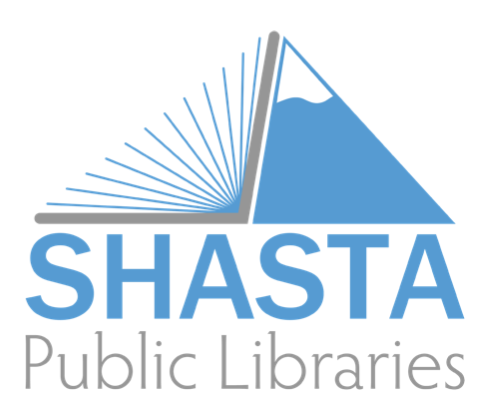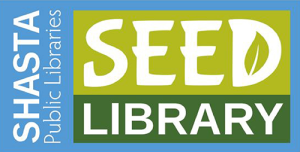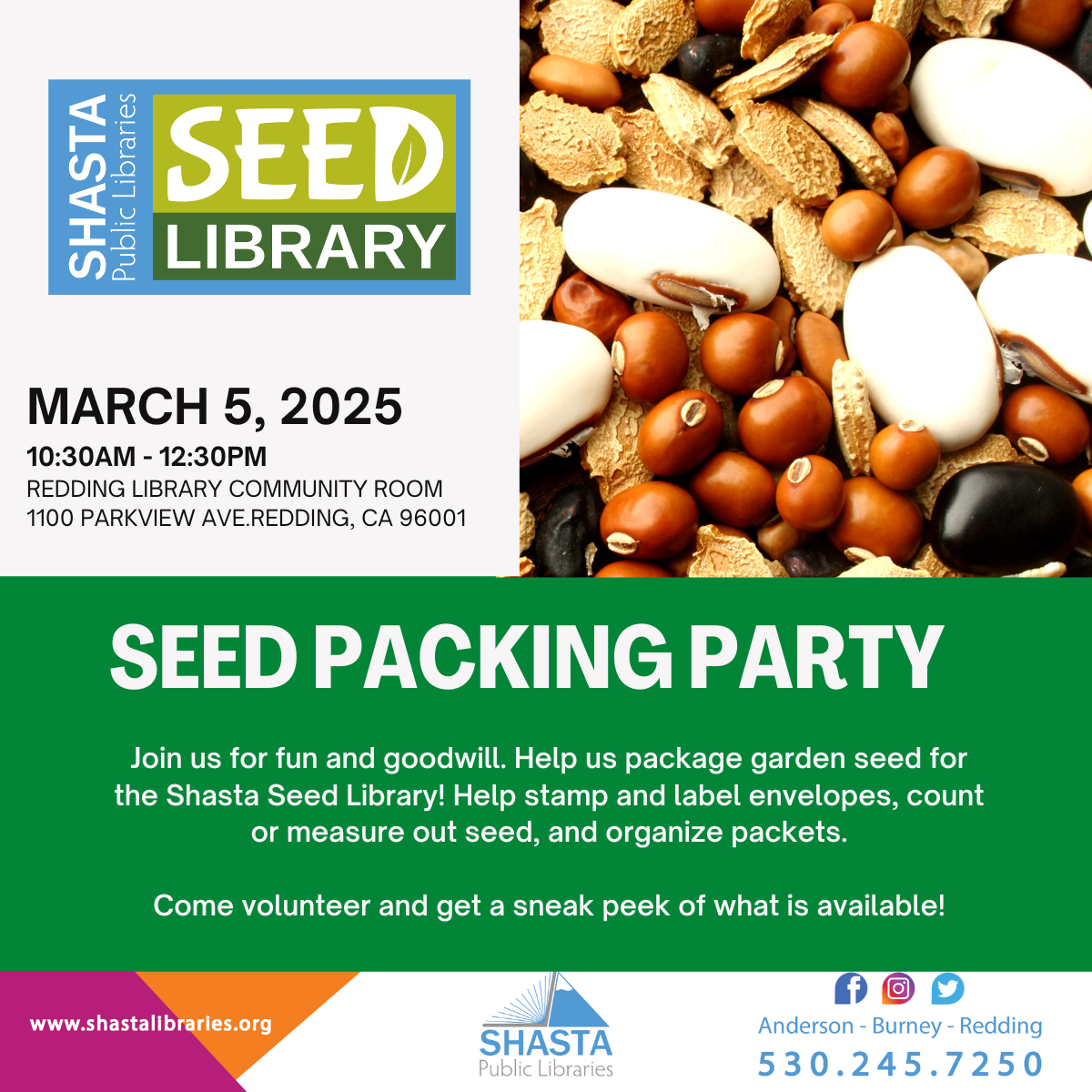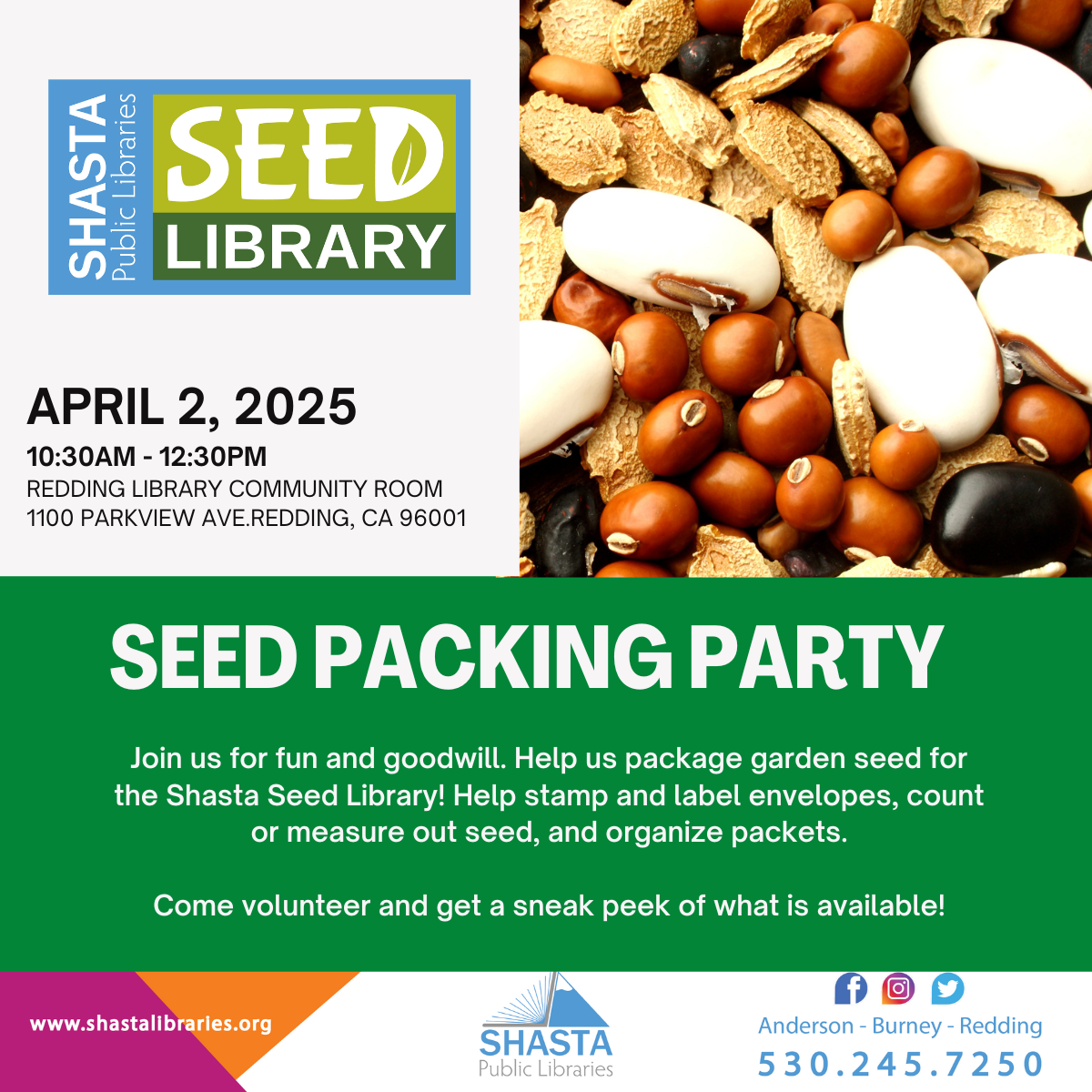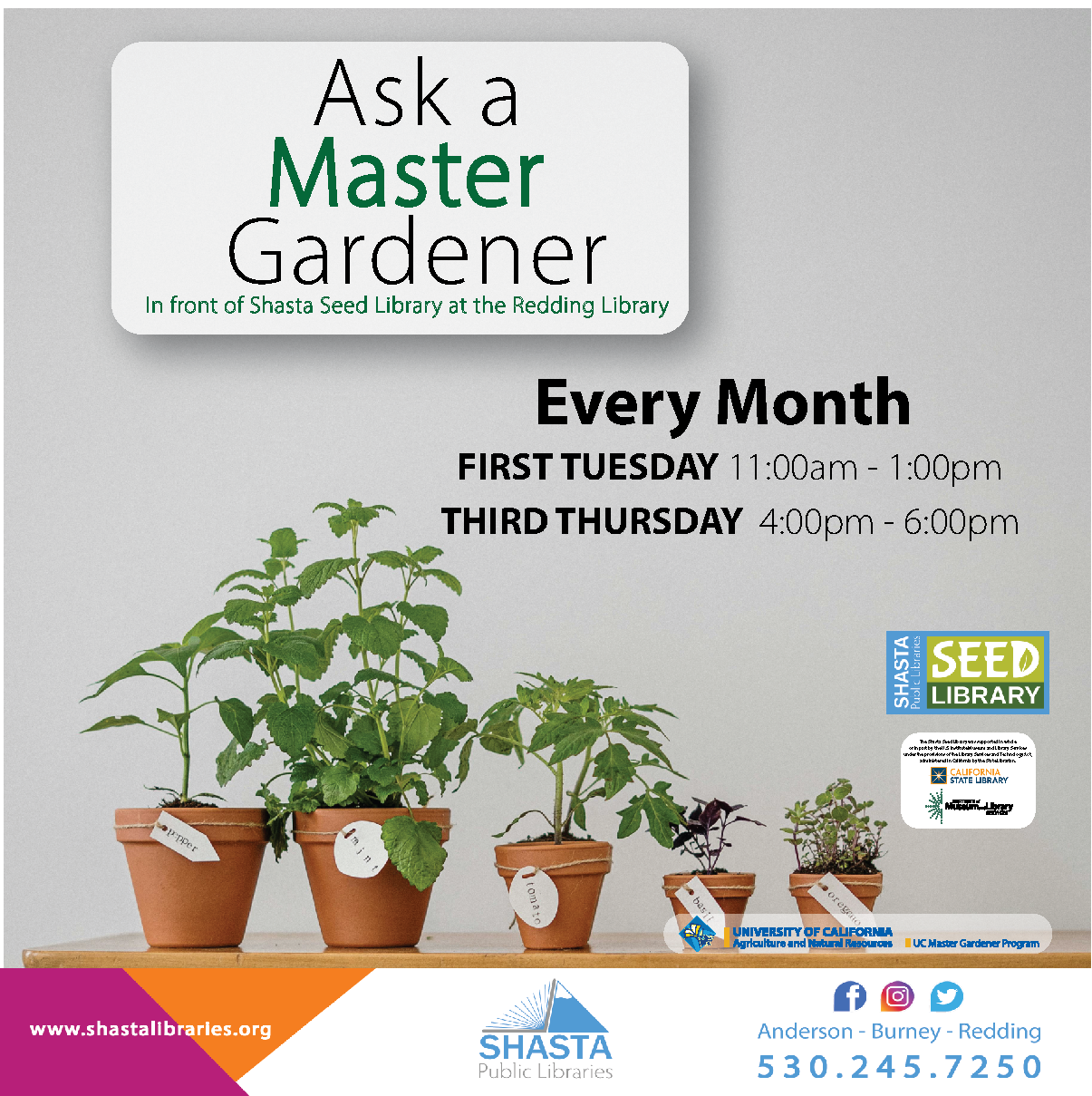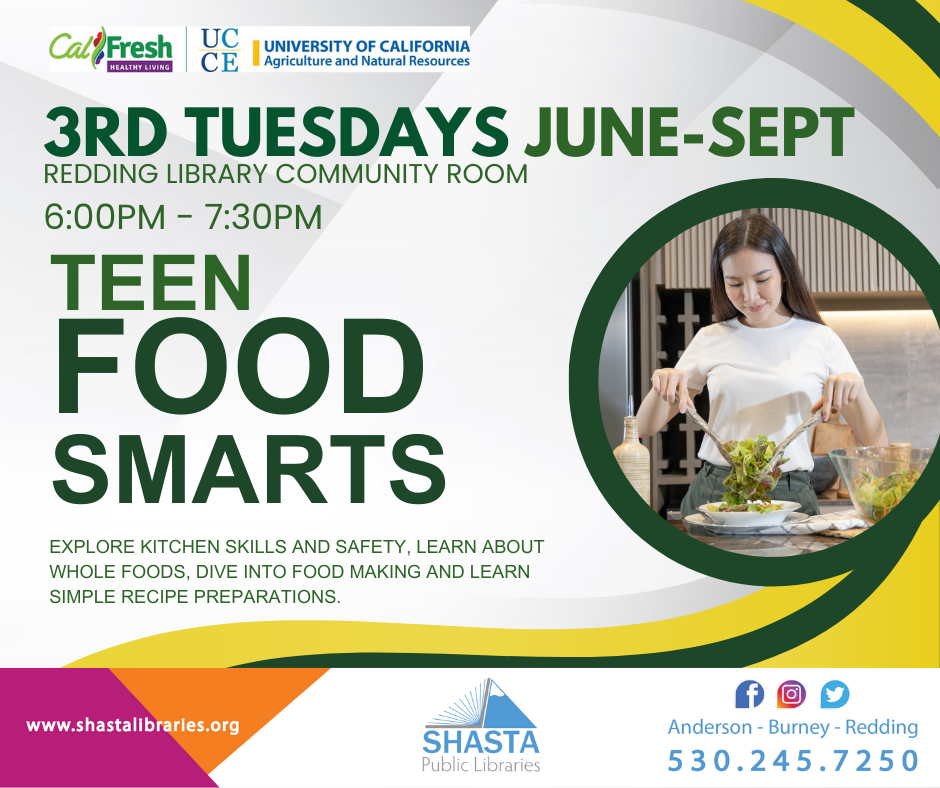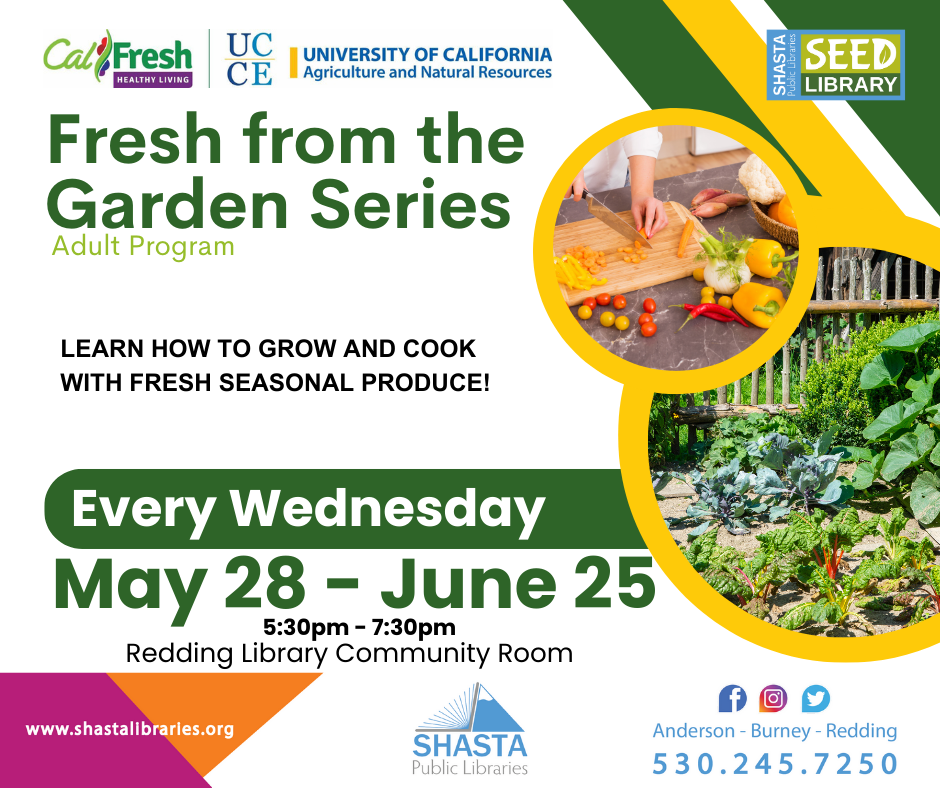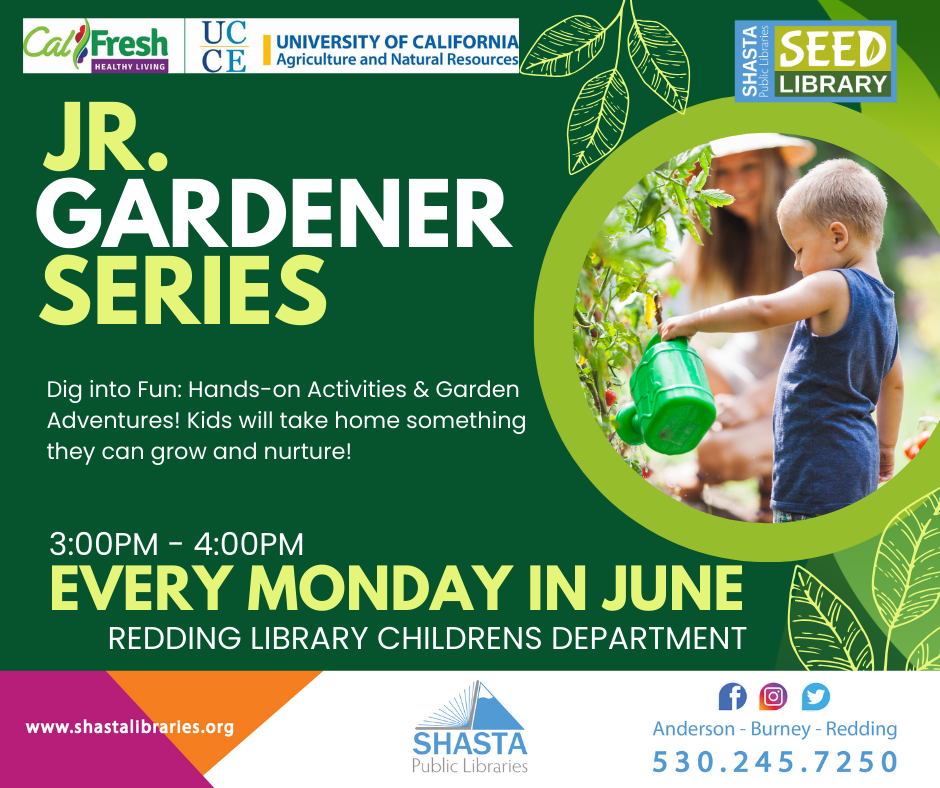HOW THE SEED LIBRARY WORKS
- BORROW
CHOOSE YOUR SEEDS! You can find more information on our available plant varieties in our plant binder. - GROW
PLANT YOUR SEEDS and enjoy the fruits of your labor!
New to gardening? Attend one of our free gardening classes or check out one of our many books on the subject! - SAVE
HARVEST SEEDS from some of your most robust and healthy plants and SAVE THEM for future growing seasons. - SHARE*
RETURN & SHARE SOME SEEDS to make your seed library a sustainable source of locally grown, climate-resilient plants! Please fill out one Shasta Seed Library seed donation slip for each variety returned.
*Returning saved seed is entirely optional.
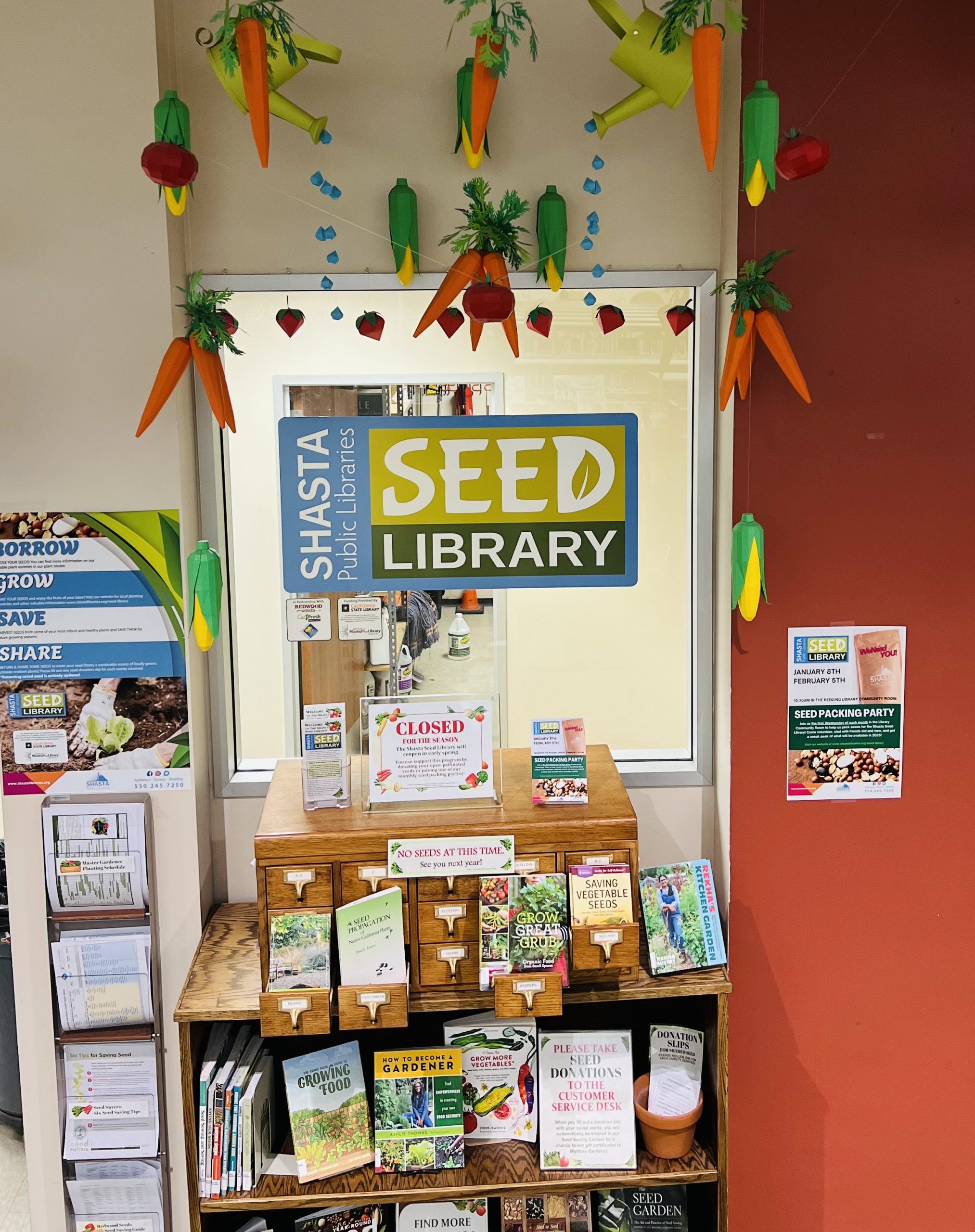
Shasta Seed Library Downloads
Great seed saving resources from Napa County Seed Library
- Napa County Seed Library has a lot of great resources for seed saving and the mechanics of pollination, etc. —> https://napacoseedlibrary.org
- Watch more Seed Saving videos on the Napa County Seed Library YoutTube channel —> https://www.youtube.com/c/NapaCountySeedLibrary
How do you use the Shasta Seed Library?
-
You become a seed library member simply by borrowing seed. This is a no-cost resource for everyone, no library account required!
-
When the Seed Library is open, you can view an index of available crops and seed varieties, as well as a plant binder with images and growing instructions, to help you decide which seeds to borrow and grow.
-
Planting schedules, seed saving guides, links to video resources, and more, are available on our website at: www.shastalibraries.org/seed-library
-
Because the seed library is a limited community resource, we ask that users be mindful of how many packets they take per visit. Multiple crops and varieties can be borrowed at each visit, but we ask that users not take multiple packets of the same variety at one time. We encourage trying out multiple varieties, but only take what you can grow in your personal garden during the current growing season.
-
Once the seed is grown out and preferred varieties are identified, we ask that our community growers consider saving and returning some seeds from a few of the healthiest plants. Saving and returning seed to the library will help make this community resource sustainable, as well as increase our inventory of locally grown and vetted crop varieties.
-
Participation in seed saving and sharing is highly encouraged but NOT REQUIRED. Seed saving does require some knowledge, and those who wish to learn more can do so through one of our seed saving workshops or by checking out one of our many books on the subject.
Why have a seed library?
-
To increase the capacity of our community members to feed themselves and their families fresh, nutrient-rich food
-
To foster community resilience, self-reliance, and food security through the time-honored tradition of seed saving
-
To promote a culture of sharing while building a no-cost, accessible source of locally-adapted seeds
-
To create a space for the exchange of information about our area’s gardening resources
Shasta Seed Library FAQs
Is our seed local, organic, or non-GMO?
The bulk of our seed is organic, non-GMO, and sourced from local growers here in the North State. That said, we also receive, and rely on, donated seed from various other sources. Some donated seed is not local, organically grown, or non-GMO.
How many seeds are in each packet?
Depending on the crop and how many seeds of each variety we have on hand, there are anywhere from 8-100+ seeds per packet. Nightshades (such as tomatoes, peppers, and eggplant), peas, beans, and cucumbers have about 10-20 seeds per packet. Melons and squash have about 8 seeds per packet. Corn, beets, chard, and brassicas (broccoli, cauliflower, collards, cabbage) have about 25 seeds per packet. And leafy greens such as spinach, kale, lettuces, and sprouts will have 100+ seeds per packet. These quantities are based on what the average home gardener will grow for themselves and their immediate families in a season. These numbers will be adjusted based on your feedback!
Can I take multiple varieties?
Yes! We especially have a lot of different varieties of tomatoes, peppers, and leafy greens for you to try out. Let us know what you like best and those varieties will be what we prioritize having in stock for future seasons.
Do I have to return seeds in order to take seed?
No. But the more seed that is grown out locally and returned, the better the seed library will function as a source of resilient, locally adapted seed. Even if seed isn’t returned to the library, we encourage users to save some of the seed for themselves from healthy plants that are tasty and have grown well to use again for future seasons.
Can I donate seeds that I have not personally grown?
Yes. While we prefer seed that has been grown locally, we also take donations of commercially grown seed or even seed that friends or relatives have grown as long as we have confirmation of the variety, location, etc. (Please fill out one donation slip per variety donated when not in a commercial seed packet).
Is there a limit to how many seed packets I can take?
We ask that users be mindful that the seed library is a limited community resource and take only one packet per variety, and only as many varieties that you can grow in your personal garden this season. Users may return and take more of a particular variety at a later visit; no one will be monitoring individual usage. Based on seed library use and user feedback during this initial season, we will adjust our protocol as necessary for future years.
When will the Seed Library be open?
The seed library will open each year in early spring. Due to limited seed supplies during the summer we are unable to reopen for fall planting.
Don't Forget to Save Your Open-Pollinated Seeds!
The Shasta Seed Library’s mission to become a no-cost, accessible resource of locally-adapted seeds is only possible with your participation. If you can save seeds from your favorite open-pollinated crops, please consider donating some to this community resource.
(Donations can be brought to the Customer Service desk at the Redding Library. Don’t forget to fill out a donation slip!)
The Shasta Seed Library was supported in whole or in part by the U.S. Institute Museum and Library Services under the provisions of the Library Services and Technology Act administered in California by the State Librarian


